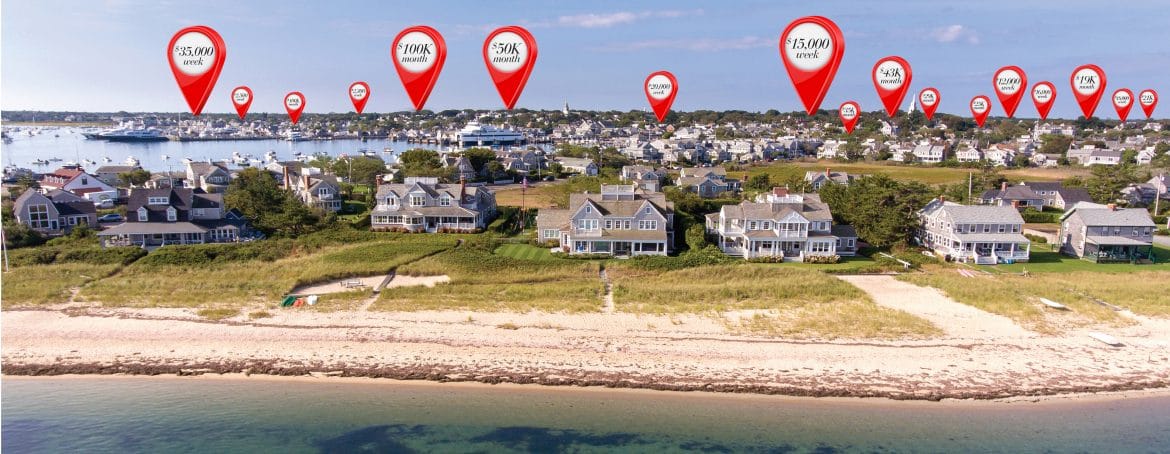“I feel like I’m in 1984,” Select Board member Matt Fee said during Wednesday night’s meeting, referring to George Orwell’s dystopian novella on government control.
Why? Short-term rentals, one of the most controversial issues on Nantucket in recent memory, were on the table once again.The Select Board was preparing to vote on whether to add a series of proposals on short-term rentals to the Town Meeting warrant for voters to consider in May, including one that would codify them and allow short-term rentals by right in all zoning districts.
But Fee was not permitted to talk about the important warrant articles with his fellow board members. The Massachusetts open meeting law had come into play in a major way: Select Board members Dawn Hill Holdgate and Melissa Murphy were both forced to recuse themselves from the debate because they derive some portion of their income from short-term rentals. Meanwhile, Select Board member Kristie Ferrantella was absent following the recent birth of her son. That left Fee and Jason Bridges as the only Select Board members left, but they did not constitute a quorum of the board.
Town Counsel John Giorgio advised Fee and Bridges that they could ask questions of staff, but could not deliberate on the topic without a quorum.
“I think it was the strangest experience I’ve ever had as a member of the Select Board,” Fee said. “I felt like I was in an alternative universe. How could we even put it on the warrant if we couldn’t talk about it or act on it?”
But in the end, that’s just what they did. Without any substantive discussion among the board members about the proposals, two zoning and general bylaw amendments related to short-term rentals were added to the warrant, which the board then approved unanimously as a whole, solidifying their place on the slate of issues island voters will take up in May.
“I considered a protest vote, but it wouldn’t have done any good,” Fee said of his vote to adopt the entire warrant, including the short-term rental articles. “It would have just got voted 3-1.”
The zoning bylaw amendment put forward by the Planning Board earlier this week would codify short-term rentals and allow them by right in all zoning districts. “We’re moving to codify what has always been happening,” Planning Director Andrew Vorce said earlier this week. A separate general bylaw amendment would regulate short-term rentals with requirements for local registration, permitting, inspection, and certain fees. It would also set up a structure to put some of the “nuisance” issues associated with short-term rentals – for example: noise and parking – in the purview of the Board of Health.
Fee told the Current what he wanted to say about those proposals during Wednesday night’s meeting, but was prevented from doing so at the time.
“What are the unintended consequences of codifying short-term rentals everywhere? Why not allow all existing residences doing them, rather than generate potential of every lot on-island to become mini-hotels?” he said. “The current approach seems like shoot first and aim second. Imagine if you were sick and went to a doctor and he said you had to ‘commit’ to a chemo path and then he would examine you and figure out what illness you had?”
Two former Select Board members, Rick Atherton and Tobias Glidden, were also critical of the proposals and the process by which they were placed on the warrant.
“There’s not been enough open honest information presented about the impact of these and the trend of these over time to move so quickly on the zoning article,” Atherton said. “It can wait a year, it can wait until fall.”
But Planning Board member Nat Lowell said the zoning bylaw amendment, which will be considered at Town Meeting as Article 42, was the right approach given the contentious regulatory and legal challenges that have been fought during the past year on the island over short-term rentals operating in residential districts.
“Article 42 is the meat and potatoes of solving the ‘lawsuit, ZBA complaint issue’,” Lowell said. “We cannot sit back and watch neighbors pitted against neighbors such as the 9 West Dover Street or 14 New Mill cases. We have codified many traditional and emerging uses in order to regulate them appropriately within reason. The term short-term rental is a new term for a longtime traditional use occurring anywhere on Nantucket like many others. If we don’t start over by codifying the use in the zoning bylaws, we won’t have the tools to regulate them appropriately in the future.”
Fee said much of the conversation at the Planning Board hearing earlier this week wrongly centered on how best to address the nuisance issues created by some short-term rentals like noise and parking. Are those better handled through zoning enforcement requests or regulations enforced by an entity like the Health Department? But the real issue, Fee said, is how short-term rentals are impacting affordable housing on the island in the long run.
He referenced a recent New York Times article on the phenomenon happening in ski towns in the Mountain West, in which long-term rentals used by the seasonal workforce were being displaced by more lucrative short-term rentals. The resulting lack of affordable housing for seasonal workers had created a labor shortage, leading to service disruptions for tourists.
Nantucket Affordable Housing Trust vice chair Brooke Mohr commented on that dynamic as it relates to Nantucket during Wednesday night’s meeting.
“I don’t have any numbers to back this up but I do have a lot of stories of people who have lost their housing because it has been sold into the seasonal market to folks who make the dollars work because they can short-term rent to afford to buy that house,” Mohr said. “What is happening is market prices rise, those buyers are coming into neighborhoods that have never been attractive to the seasonal buyer, and our year-round neighborhoods are being eroded by the short-term market and the financial incentives of short-term rentals…To say this has no impact on year-round housing is a falsehood because the person who used to be able to buy at a certain neighborhood at $2 million can’t get that house anymore, and they’re going to Essex Road, and Bartlett Road and Larrabee Lane and Anna Drive and all of the neighborhoods that have been strictly year-round neighborhoods since I’ve been coming to Nantucket and these are becoming full-time short-term rentals and displacing year-rounders.”
Last year, Nantucket voters at the 2021 Annual Town Meeting soundly rejected a citizen petition brought forward by the political action non-profit group ACK Now to regulate and restrict short-term rentals. Since then, several citizens have brought zoning enforcement actions against their neighbors, claiming that short-term rentals, operating essentially as a hotel or lodging business, are not permitted in residential zoning districts. Nantucket’s Building Commissioner and the island Zoning Board of Appeals have ruled on several occasions that short-term rentals are, in fact, allowed to operate in those districts.
The proposed zoning bylaw to codify short-term rentals, advocates say, would preempt those disputes, and will bring needed clarity in light of a recent Massachusetts Supreme Judicial decision last year – known as the “Styller” or “Lynnfield” case – which some have interpreted as prohibiting short-term rentals in residential zoning districts.






